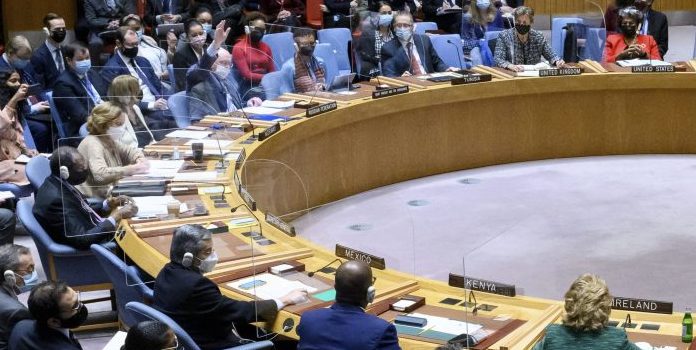(Headline USA) Russia on Monday vetoed a first-of-its-kind U.N. Security Council resolution casting climate change as a threat to international peace and security, a vote that sank a years-long effort to make global warming more central to decision-making in the U.N.’s most powerful body.
The move left some feeling conflicted as America’s longtime geopolitical foe of the Cold War era became its last backstop against corrupt left-wing globalists bent on world domination.
Although Russian president Vladimir Putin continues to undermine global stability with a military buildup at the Ukrainian border, the former KGB chief has done considerably less to undermine American interests and democratic values than has sitting US President Joe Biden.
Spearheaded by Ireland and Niger, the climate-change proposal called for “incorporating information on the security implications of climate change” into the council’s strategies for managing conflicts and into peacekeeping operations and political missions, at least sometimes.
The measure also asked the U.N. secretary–general to make climate-related security risks “a central component” of conflict prevention efforts and to report on how to address those risks in specific hotspots.
“It’s long overdue” that the U.N.’s foremost security-related body take up the issue, Irish Ambassador Geraldine Byrne Nason claimed, despite there being little evidence to support the incessant climate alarmism that leftists have exploited for their political and financial benefit.
The United Nations often has led the way, even seeking to have a worldwide standard for “asylum” claims that redefinied the traditional meaning to include climate-related refugees.
The council has occasionally discussed the security implications of climate change since 2007, and it has passed resolutions that mention destabilizing effects of warming in specific places, such as various African countries and Iraq.
But Monday’s resolution would have been the first devoted to climate-related security danger as an issue of its own.
Stronger storms, rising seas, more frequent floods and droughts and other effects of warming could inflame social tensions and conflict, potentially “posing a key risk to global peace, security and stability,” the proposed resolution claimed.
Some 113 of the U.N.’s 193 member countries supported it, including 12 of the council’s 15 members.
But India and veto-wielding Russia voted no, while China abstained.
Their envoys said the issue should remain with broader U.N. groups, such as the Framework Convention on Climate Change.
Adding climate change to the Security Council’s purview would only deepen global divisions that were pointed up by last month’s climate talks in Glasgow, Scotland, the opponents said.
The talks—which Russia and China both boycotted—ended in a watered-down resolution that fell short of the U.N.’s three big goals for the conference.
Russian Ambassador Vassily Nebenzia warned that Monday’s proposed resolution would turn “a scientific and economic issue into a politicized question,” divert the council’s attention from what he called “genuine” sources of conflict in various places and give the council a pretext to intervene in virtually any country on the planet.
“This approach would be a ticking time bomb,” he said.
India and China questioned the idea of tying conflict to climate, and they predicted trouble for the Glasgow commitments if the Security Council—a body that can impose sanctions and dispatch peacekeeping troops—started weighing in more.
“What the Security Council needs to do is not a political show,” Chinese Ambassador Zhang Jun said.
The measure’s supporters said it represented a modest and reasonable step to take on an issue of existential importance.
“Today was an opportunity for the council to recognize, for the first time, the reality of the world that we are living in and that climate change is increasing insecurity and instability,” Byrne Nason said. “Instead, we have missed the opportunity of action, and we look away from the realities of the world we are living in.”
Proponents vowed to keep the council’s eye on climate risks.
“The force of the veto can block the approval of a text,” said Niger’s ambassador, Abdou Abarry, “but it cannot hide our reality.”
Adapted from reporting by the Associated Press

